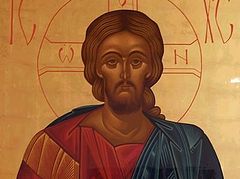In the name of the Father, the Son and the Holy Spirit.
Today's Gospel is not only about miracles and the mercy of God; to me it is about hope beyond hope. In the story of the daughter of Jairus we see a child already dead. Everyone knows about it—there is such certainty that when the Son of God, Who became the Son of Man, says, “No! This child is not dead, but sleeping”, everyone contradicts Him: No, this child has died. And then with a word of power, but in an act of love, Christ calls the child back to earthly life.
Apart from being a true event in our human history, isn't this also a parable, an image of so many human situations? How often we say, “There is no point in doing anything about this person, this person is lost”; there is no way to redeem a given situation, the situation is beyond redemption. And we must remember the words Christ spoke to Peter when he said, “Who then can be saved?” The Lord said to him, With men this is impossible; but with God all things are possible (Matt. 19:26).
Hope beyond hope—not because we have good reason to hope, but because we can possess a passionate certainty that not only divine love also but human love can bring what was lost back to life. If people who have fallen into the deepest dereliction, people who seem to us to be hopelessly evil, are met with the sacrificial love of God (and the word sacrificial is essential), and the same sacrificial love in us, they can be redeemed.
In the case of this child it happened immediately. In our own relationships to one another it may take years—years of patient love, years during which we will give ourselves, but also endure, endure endlessly the most unendurable things; and in the end there can be redemption. There can be redemption on this earth, in the form of a person who was thought to be hopeless, beyond help, but who begins to change. Then we see a miracle, we are elated, hope becomes complete and real, and joy fills our heart.
But there is also another way in which this sacrificial love can be redemption. One western theologian said around the time of the last war,[1] when feelings were deep and pain acute, that suffering is the meeting place between evil and humanity. Suffering is always caused by human agency, or human agency turns away from it and does not alleviate it. And suffering always cuts into people’s souls or bodies. But when it has happened, the victim acquires the divine power to forgive; and through forgiveness, the power to undo the evil, and to redeem those who have done the evil.
Let us reflect on this; this thought came to me not from reflection, and indeed not from my own life, which has always been too easy to allow me to speak such words. But after the war, a document was found in one of the concentration camps. It was written on a torn sheet of wrapping paper by a man who died in that camp. The substance of his message was a prayer in which he said, “Lord, when You come as Judge of the earth, do not condemn the people who have done such atrocious things to us; do not hold against them their cruelty and our suffering, their violence and our despair, but look at the fruit which we have borne in patience, in humility, in fortitude, in forgiveness, in loyalty, in solidarity; and may these fruits be accounted unto their salvation. Let not the memory of us be to them horror in eternity; may it be unto their salvation.
This is also hope beyond hope. And to me it is connected with this contrast between the sinful, false, and blind knowledge expressed by the people in the house. They laugh at Christ, they know that the child is dead, hope is superfluous, it is drowned in despair. But the victory of love and mercy is manifest in the event, and it can reach in so many ways into our personal lives—on the most basic and the most heroic levels.
Let us therefore think about this, and choose hope beyond hope; choose the love and faith that conquer. Amen.




